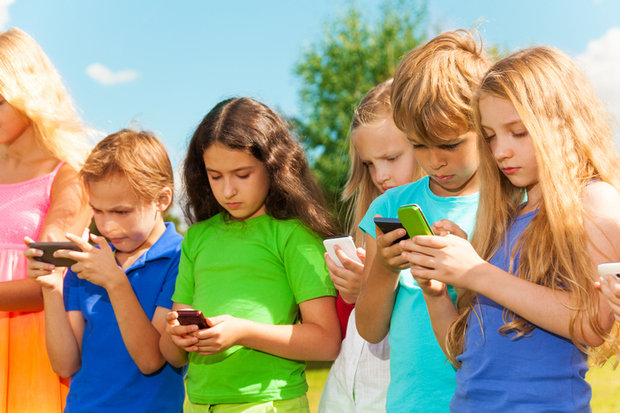Blog Post
Silicon Valley experts see screens as a “dark force” in the lives of children
By Jonathon Van Maren
Anyone who has kids knows that children change when their eyes lock on a screen. My daughter is barely over a year old and gets no screen time whatsoever, but if she spots a TV in restaurant or sees me scroll on my smartphone, her eyes fixate on the screen, her expression becomes simultaneously intense and somehow vacant, and the rest of the world seems to fade away—or collapse into the screen. In some ways, you can watch her personality disappear as she focuses all of her attention on the screen she has spotted.
Many of my friends have come to the same conclusion and try to give their children as little screen-time as possible. This is often no easy task, considering that most of us struggle to ensure that we are running our technology rather than the other way around—and when life gets hectic, screens can make convenient, if unhealthy, babysitters. For most parents, this is an omnipresent temptation.
And then there’s the fact that children are being exposed to pornography at an increasingly young age—often between nine and eleven—because screens and the Internet afford them so much opportunity to get exposed to all the online world has to offer. Additionally, porn companies are actually targeting kids in order to get them hooked on their product sooner, tagging hardcore porn videos with phrases like “Dora the Explorer” in order to ensure that children will click on porn videos by accident.
According to the New York Times, even those who created the technology that now dominates so much of our lives are beginning to see it as a dark and powerful force—a force to be negotiated with very carefully:
The people who are closest to a thing are often the most wary of it. Technologists know how phones really work, and many have decided they don’t want their own children anywhere near them.
A wariness that has been slowly brewing is turning into a regionwide consensus: The benefits of screens as a learning tool are overblown, and the risks for addiction and stunting development seem high. The debate in Silicon Valley now is about how much exposure to phones is O.K.
“Doing no screen time is almost easier than doing a little,” said Kristin Stecher, a former social computing researcher married to a Facebook engineer. “If my kids do get it at all, they just want it more.”
Ms. Stecher, 37, and her husband, Rushabh Doshi, researched screen time and came to a simple conclusion: they wanted almost none of it in their house. Their daughters, ages 5 and 3, have no screen time “budget,” no regular hours they are allowed to be on screens. The only time a screen can be used is during the travel portion of a long car ride (the four-hour drive to Tahoe counts) or during a plane trip…
Athena Chavarria, who worked as an executive assistant at Facebook and is now at Mark Zuckerberg’s philanthropic arm, the Chan Zuckerberg Initiative, said: “I am convinced the devil lives in our phones and is wreaking havoc on our children.”
Ms. Chavarria did not let her children have cellphones until high school, and even now bans phone use in the car and severely limits it at home. She said she lives by the mantra that the last child in the class to get a phone wins. Her daughter did not get a phone until she started ninth grade.
“Other parents are like, ‘Aren’t you worried you don’t know where your kids are when you can’t find them?’” Ms. Chavarria said. “And I’m like, ‘No, I do not need to know where my kids are every second of the day.’”
For longtime tech leaders, watching how the tools they built affect their children has felt like a reckoning on their life and work. Among those is Chris Anderson, the former editor of Wired and now the chief executive of a robotics and drone company. He is also the founder of GeekDad.com.
“On the scale between candy and crack cocaine, it’s closer to crack cocaine,” Mr. Anderson said of screens. Technologists building these products and writers observing the tech revolution were naïve, he said.
“We thought we could control it,” Mr. Anderson said. “And this is beyond our power to control. This is going straight to the pleasure centers of the developing brain. This is beyond our capacity as regular parents to understand.”
He has five children and 12 tech rules. They include: no phones until the summer before high school, no screens in bedrooms, network-level content blocking, no social media until age 13, no iPads at all and screen time schedules enforced by Google Wifi that he controls from his phone. Bad behavior? The child goes offline for 24 hours.
“I didn’t know what we were doing to their brains until I started to observe the symptoms and the consequences,” Mr. Anderson said.
“This is scar tissue talking. We’ve made every mistake in the book, and I think we got it wrong with some of my kids,” Mr. Anderson said. “We glimpsed into the chasm of addiction, and there were some lost years, which we feel bad about.”
His children attended private elementary school, where he saw the administration introduce iPads and smart whiteboards, only to “descend into chaos and then pull back from it all.”
This idea that Silicon Valley parents are wary about tech is not new. The godfathers of tech expressed these concerns years ago, and concern has been loudest from the top.
Tim Cook, the C.E.O. of Apple, said earlier this year that he would not let his nephew join social networks. Bill Gates banned cellphones until his children were teenagers, and Melinda Gates wrote that she wished they had waited even longer. Steve Jobs would not let his young children near iPads.
But in the last year, a fleet of high-profile Silicon Valley defectors have been sounding alarms in increasingly dire terms about what these gadgets do to the human brain. Suddenly rank-and-file Silicon Valley workers are obsessed. No-tech homes are cropping up across the region. Nannies are being asked to sign no-phone contracts.
If even those who created the devices that now occupy our every waking moment are trying to keep these screens away from their children, perhaps we should all consider doing so, as well. It may be inconvenient, but it is certainly safer and healthier.
_____________________________________________
For anyone interested, my book on The Culture War, which analyzes the journey our culture has taken from the way it was to the way it is and examines the Sexual Revolution, hook-up culture, the rise of the porn plague, abortion, commodity culture, euthanasia, and the gay rights movement, is available for sale here.








